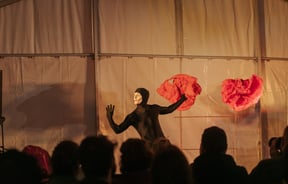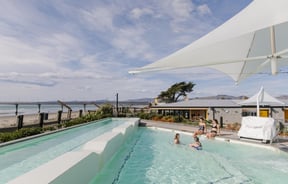Meet and Greet: Barkeepers of St Asaph Block

On any given week, St Asaph Street comes alive with fun and creative happenings, drawing a lively buzz to the neighbourhood. This area between Fitzgerald Ave and Barbadoes Street has earned itself a reputation for its inclusive and down-to-earth bar and nightlife scene, where local musicians and artists take centre stage.
From sharing how they started out to revealing their hopes for Ōtautahi Christchurch’s future, here’s what Feather from Darkroom, Megan and Richard from Space Academy, and Lois from Scoundrel had to say.
There are many dedicated individuals to thank for shaping St Asaph Street into the thriving community hub it is today. We caught up with the people behind three of the block’s iconic local spots – the ones pouring your pints and curating creative event programmes that ensure your weekend is never boring.
Read More:
Insider’s Guide to Christchurch’s St Asaph Block
Ōtautahi Fan Club: Kendra Walls on Central City Living
Words by: Maggie Worthington
Photos by: Nancy Zhou and Jerome Warburton
Feather Shaw

Darkroom
Tell us a little about your journey as an event venue operator.
I've spent most of my adult life in venues both onstage and off, as a comedian, musician, circus artist, cabaret performer, roadie for stadium concerts, producer, playwright, and director. I've also worked at community centres in events-focussed roles, as well as in the tourism industry. I've dabbled in hospitality as most creative folk do – we end up making coffee, waiting tables, or pouring pints to make ends meet when our creative income isn't quite paying the bills.
My business partner Nick studied audio engineering at MAINZ, and used to work at another music venue, Al's Bar, pre-quake. He plays a bunch of instruments and is in a number of bands. Most notably Nick plays in The Wendys, and I play in Bin Day.
When Darkroom came up for sale, we realised together we had the complementary skills to take the reins.
How long have you had Darkroom and how would you define its style?
We bought the venue from Marcus Winstanley and took over in January 2019, but Darkroom has been here for 13 years!
Darkroom was established to help fill the void after the earthquakes led to the closure of many of the city’s creative spaces. It opened its doors just months after the February 2011 earthquake, when the central city red zone was a mere 200m down the road. The space is a symbol of resilience, of the way the arts become a place of solace. Even in the wake of tragedy, art thrives.
In terms of our aesthetic, one time someone described us as a 1970s garage sale in a derelict tin shed. I think they were trying to be mean, but I think that description was actually pretty spot on. We took it as a compliment.
What do you want people to experience when visiting Darkroom?
Original live music in a welcoming space for folks on the fringes of society to gather. We (along with our audiences) don't mind if you only know a couple of chords or if your instrument of choice is hitting pots and pans.
What's your favourite thing to order from your hospo neighbours?
I get coffee from Scoundrel most days, and their chickpea tacos are my fave. Nick loves the cauliflower bites.
What are your hopes for the future of Christchurch's hospitality and nightlife scene?
We hope spaces like ours will not be seen as noise to complain about but rather be considered as intentional sounds that are curated, creative, and artistic – a contribution to the vibrancy and culture of our city.
Grassroot galleries, studios, music venues and record shops need to be as much a part of the ecosystem as brand new stadiums and theatres. No one becomes a stadium rockstar overnight without first playing in a little space like ours.
I chose to move to post-quake Ōtautahi to be a part of its thriving and resilient creative community. I grew up in Dunedin, moved to Melbourne in my early 20s, and spent a bunch of time in some of the most amazing creative cities, including Los Angeles and Berlin. I could have chosen to live anywhere, but I chose Ōtautahi because of its potential. Those other big cities don't need another quirky venue or all-woman band, but it still feels like you can actually have a bit of an impact here. As our mayor says, we have the potential to be a "mini-Melbourne" and a "cultural powerhouse". How exciting to have a council seeing that possibility for our city – let's make it happen!
I am all for modern, liveable cities where we can live centrally and walk and cycle places with ease. It's a delicate balance of making sure the residential development in the central city doesn't push out and close down our night time economy, which is part of what makes the city a vibrant and fun place to live.
Richard & Megan Barnacle

Space Academy
Tell us a little about your hospitality journey.
The three of us (Hamish, Meg and Rich) came into this with very little experience working in hospo. Meg had owned and run Cafe Woohoo alongside and within Gapfiller’s post-quake Pallet Pavilion, which was a comparatively small operation.
Our lack of insight probably gave us some substantial delusion around the reality of running and being involved in hospo. It likely led us to forge more of our own path in some ways, not having much of a blueprint to go off.
How long have you had Space Academy, and how would you define its style?
We have been open for nine years now, but started tinkering around inside this warehouse over 10 years ago. It took one year of solid effort and heaps of our friends and whānau pitching in here, there and everywhere to prepare the space for our opening.
During our first year, Doki Hair Salon and Kadett Cafe were coming into play too. Our style was a collaboration between all of the ideas and visions between the group of people and projects sharing the space (with a tiny budget to make it happen).
We were inspired by hospitality spots in Japan, Aotearoa, Melbourne and even some that we had seen online. Tessa from Frances Nation offered an original design for the layout of the space and brought her magic. One of our shelves was designed and installed as part of ‘Whole House Re-use’, where the entirety of the material from a red-zoned home was deconstructed and transformed into beautiful and purposeful artefacts. Artist/sculptor/furniture maker and friend Tim McGurk rescued materials and went on to build our incredible stage, stools and high tables.
The plants are a pretty big feature as well, many of which have been gifted to us throughout the years by staff, customers and our groundskeeper. We were able to make a reasonably sized courtyard out of our carpark and the dream is for that to be overrun by plants.
There is a huge amount of history and whakapapa in the style here and this has evolved out of the time, input and energy of so many people in this community.
What do you want people to experience when visiting Space Academy?
We want people to experience some of the cool shit coming out of this city in a relaxed, welcoming and comfortable environment. We hope everyone feels able to express themselves freely, whatever their background.
What's your favourite thing to order from your hospo neighbours?
Lotus Heart offers some pretty all-time smoothies and their Humming burger and fries is next level. It’s great to have a solid coffee option over at Scoundrel and theirs is a comfortable spot for us to take meetings or meet up with friends and whānau on our lunch break.
What excites you about the future of this neighbourhood?
This neighbourhood prides itself on being a pretty safe place to enjoy nightlife and that’s a beautiful concept to uphold. We would love to see more small-scale, inventive and fun projects around here and even more people out and about, enjoying the buzz in the area. Getting to know and build relationships with our neighbours is something we’re excited about.
The music scene here is humming. The collaboration, creativity and risk-taking is pretty stunning and it’s exciting to think about the expansion of that and all the music that hasn’t been written yet.
What are your hopes for the future of Christchurch's hospitality/nightlife scene?
More safety. We are facilitating safer spaces around here and engaging in harm prevention and we hope that this can become more of the norm for Ōtautahi.
We also run things with the best waste practices we can muster – something we’d love to see more of in the city. You can have a big impact on waste reduction when you’re the one facilitating dinner and drinks for a bunch of people each night and managing that output is a privilege we enjoy.
Lois Parmenter

Scoundrel
Tell us a little about your hospitality journey.
We've all been in the hospo game for years now. We've filled roles in kitchens, front of house, management and operations. We've all shared a vision to create a space that combines the best bits of what we've seen over the years. Scoundrel’s a reflection of that – something with character, warmth and a bit of edge.
How long have you had Scoundrel, and how would you define its style?
We opened Scoundrel in November 2023 and it’s definitely evolved in the time since. Our style is raw and industrial, but cosy, with a good splash of green from all the plants. There’s a bit of grit, but it’s balanced with genuine hospitality and a focus on top-quality food and drinks – nothing too fancy, just real.
What do you want people to experience when visiting Scoundrel?
I want people to feel at ease, like they’ve wandered into a mate’s place that just happens to have epic tacos and an awesome drinks cabinet. The idea is to let loose, chill out and enjoy the food, drinks and vibes without any pretension. You bring your dog, have a wine on tap and just soak in the good times.
What's your favourite thing to order from your hospo neighbours?
Depends on the day! I’m always a sucker for a solid tipple from one of the live music spots, Darkroom and Space Academy, coupled with a chance to check out some of the homegrown new music talent coming through. And if we're after a bite, there’s some cracking eats around town – I love grabbing a cheeky pizza from Pizza Trap or Lillies.
What excites you about the future of this neighbourhood?
This area’s got mad potential. There’s a buzz here, with more small, independent businesses popping up and people getting creative with what they offer. I reckon it’s on the brink of becoming a real hub where locals and out-of-towners alike want to hang out. It’s exciting to see this edgy wee community grow and support each other.
What are your hopes for the future of Christchurch's hospitality/nightlife scene?
We'd love to see it expand without losing that personal touch: more venues doing their own thing, not just following trends but making spaces that are unique and true to their vibe. It has the potential to be a thriving, diverse scene where we’re all working together, supporting each other and pushing Ōtautahi forward as a must-visit spot for food and nightlife.





